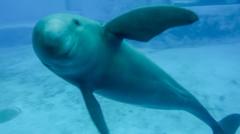John Hume, the renowned conservationist, has denied smuggling charges, claiming to have no wrongdoing amid serious allegations of international trafficking.
Conservationist John Hume Defends Against Serious Smuggling Charges

Conservationist John Hume Defends Against Serious Smuggling Charges
South African leader in conservation claims innocence in multimillion-dollar rhino horn case.
A prominent South African conservationist is facing serious legal challenges as John Hume has been charged with smuggling rhino horns valued at $14 million (£10 million). Hume, known for having owned the world's largest rhino farm, insists he is innocent and has "nothing to hide." Along with five other individuals, including a game reserve manager and a lawyer, he appeared in a Pretoria magistrate's court on 55 charges. These include money laundering, theft, and fraud, as part of a purported international rhino horn trafficking operation spanning from 2017 to 2024.
Prosecutors allege that Hume and his associates smuggled over 960 rhino horns, acquiring local sale permits while their actual intent was to export these horns to Southeast Asia, where they are utilized in traditional medicine practices. Although the sale of rhino horns is permissible among South African citizens, any exportation is prohibited.
During the initial court proceedings, Hume and his co-defendants were granted bail but did not enter a plea. Hume publicly proclaimed his innocence, stating, "I categorically reject the allegations against me and maintain that I have never acted unlawfully. I am confident that, once the facts are tested in court, I will be vindicated and my innocence confirmed."
Hume is a significant figure in wildlife conservation, having previously managed Platinum Rhino, which housed around 2,000 southern white rhinos. He sold this farm in 2023, expressing that he could no longer continue the extensive support required for breeding these animals, which had been his passion for over twenty years.
Born in Zimbabwe to a farming family, Hume transitioned from developing holiday resorts in the 1990s to focusing on conservation efforts, marking a significant shift in his career and life's work. As the legal battle unfolds, the conservation community watches closely, with the outcome potentially impacting future conservation efforts in South Africa.




















